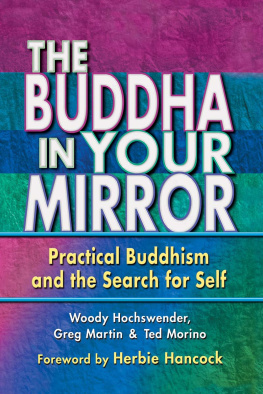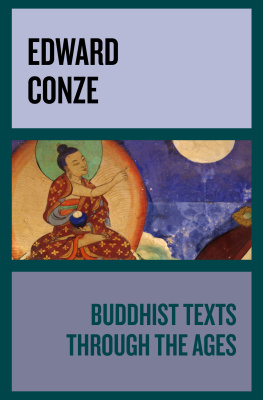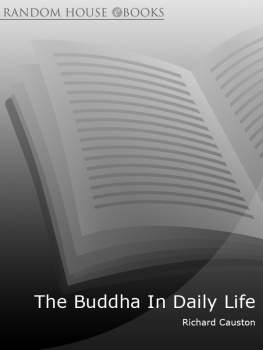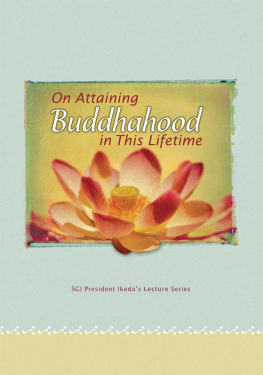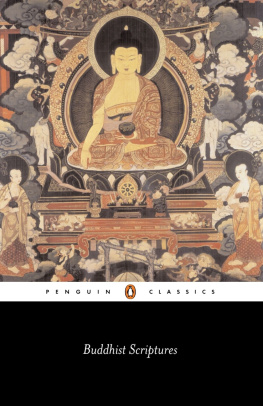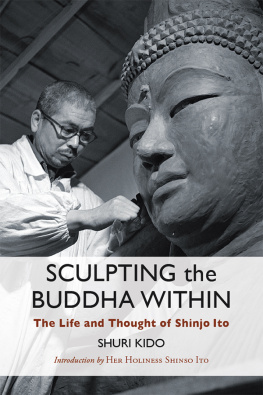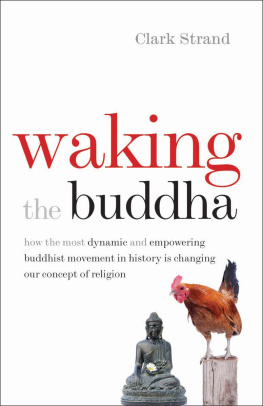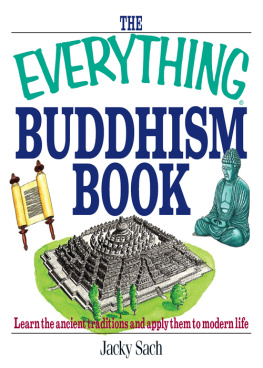
Published by Middleway Press
A division of the SGI-USA
606 Wilshire Blvd., Santa Monica, CA 90401
2001 SGI-USA
ISBN: 978-0-9674697-1-3 (hardcover)
ISBN 978-0-9674697-8-2 (softcover)
Cover design by Lightbourne
Interior design by Gopa & Ted2, Inc.
All rights reserved
Printed in the United States of America
Library of Congress Cataloging-in-Publication Data
Hochswender, Woody, 1951
The Buddha in your mirror : practical Buddhism and the search for self / Woody Hochswender, Greg Martin, Ted Morino.
p. cm.
Includes bibliographical references and index.
ISBN 0-9674697-1-6 (hardcover : alk paper)
ISBN 0-9674697-8-3 (softcover : alk paper)
1. Religious lifeSoka Gakkai.
2. Nichiren, 12221282. I. Martin, Greg, 1950
II. Morino, Ted, 1947 III. Title.
BQ8436.H63 2001
294.3444dc21 2001000679
Table of Contents
No Butter Notes
a foreword by Herbie Hancock
W HY HAVE YOU , no matter what your realm of life, picked up this book? Even for a moment. Wouldnt you agree that no matter where were at, we can always be at least a little happier? And while we may be feeling pretty good today, sometimes without warning or explanation, we just end up in a funk.
Even those of us who may appear to have been blessed in this life have our periods when the good things around us still dont allow us to live with joy. There has to be something more, something deeper.
But even when by all appearances things are going well, we often dont recognize that we are experiencing problems. When I think about the many contemporaries and friends in my profession who have come and gone, the legends who have passed from this life too soon, whose musical voices were silenced through losing the battle of illness or drugs, the need for a method to acquire lasting happiness is obvious.
The realities of the jazz life (and Im sure its the same for many occupations) are not easy. It takes a lot of strength, physical and spiritual, to tour constantlysometimes traveling to a new country every day for months on end, to continue to tap ones creativity, to maintain healthy relationships. In the midst of lifes stark realities, on both the professional and personal levels, it has been the profound, yet easy-to-grasp, life-affirming philosophy of Nichiren Buddhism that has sustained me for some twenty-nine years.
But lets back it up a bit.
I wasnt born into a rich familyin fact, we were quite poor. But I was fortunate in that we always had food on the table. Even more important, I had the support of parents who encouraged me to live my dreams. And they supported those dreams to the best of their ability. Though they couldnt afford to send me to college, they did anyway, somehow.
Along with the support of my parents, my life has largely been guided by various mentors Ive had the fortune to encounter along the journey to today. Three of them especially stand out. The first was the second piano teacher I ever hadMrs. Jordan.
Way back before jazz was a part of my consciousness, I was a nine-year-old boy with two years of piano study under my belt. This was in Chicago, 1949. I cant remember now how I was introduced to Mrs. Jordan, but to this day, I cant forget what she taught me. After hearing me play a bit she said that, yes, it was clear I could read music. But at that very first meeting she asked me if I was familiar with things like touch, nuance, phrasingeven how to breathe when I sat at the keyboardconcepts that were alien to my experience. When I said no, she said, Ill show you. And she sat down and played a piece by Chopin that was so gorgeous my nine-year-old jaw dropped.
Mrs. Jordan taught me that playing the piano was so much more than just knowing the notes. Watching her play with such warmth, such dignity and such passion, I was able, without realizing it, to pick up the idea that the piano was an instrument for self-expression.
Through her honesty and continual efforts to find the means to explain to a young boy that which might otherwise remain ungraspable, Mrs. Jordan fired my desire to learn. And as a testament to her teaching abilities, in just about a year and a half, I won a major Chicago piano competition and got to play a concerto with the Chicago Symphony at Orchestra Hall.
Studying with Mrs. Jordan was the first time I remember seeing a new dimension in something seemingly familiar, and the impact of that has stayed with me all this time. In fact, I think thats what great mentors do; they excite within you a capacity to look at something in a new way, a way that resonates particularly within you. What I also got from Mrs. Jordan, without realizing it at the time, was a sense of how one persons sincerity could have a permanent impact on another.
Miles Davis was that kind of mentor, too. He was a singular character who was so fully the master of his instrument and his music that he solidly did things the way he felt they ought to be. Miles took a lot of flack for turning his back on audiences in performance. But those of us in his band saw clearly that he did that in order to direct us in subtle waysa head shake here, a slight gesture with his horn thereas he continued his own virtuosic playing. Miles just forged ahead and never felt the need to explain himself.
Those of us who worked with and for Miles got a taste of his particular genius, which went beyond his playing. What was really special was his ability to draw all of us into the process and completely integrate whatever we brought to the table. He told us that he was paying us to do our practicing right there on the bandstand, that he was hiring us to create, to contribute something. And onstage or in the studio, he proved repeatedly that whatever we came up with, he could seize it and make something happen. On many occasions he saved our butts with this ability, turning our outright mistakes into musical themes he would instantly incorporate into whatever we were cooking.
And when we got stuck, he had the knack for getting us out of itin his own peculiar way. Once, when I faced the musicians equivalent of writers block, Miles leaned over and mumbled in my ear: Put a B in the bass. A bit puzzled, I tried to work in what I thought he was talking about, and sure enough a spark started to happen, which fed him, which in turn fed me, leading to a musical dialogue.
Another time when I was in a rut, he dropped this on me: Dont play the butter notes. That sent my mind reeling. Finally, I assumed he was telling me to somehow avoid the obvious. Im not even sure to this day if Miles really knew what he meant, but I took it to mean remove the thirds and sevenths from the chords I was playing. Without getting too technical musically, lets just say this opened up the sound so that whomever I would be improvising with could make much more of a contribution to exploring the possibilities of a melody. Whatever Miles had in mind, the guidance workedwe caught fire! To me, thats an example of greatness in leadership. Instead of dictating, he stimulated me to find the solution within myself, the whole time supporting me with the full confidence that he could harmonize with all of us and get us to create harmony together.
Miles continually made us feel that each of us had something unique that only we could contribute. He did this with few words; it was mostly through his behavior. I couldnt fully realize this back thenI saw it only after I started my practice of Nichiren Buddhism.
Which leads me to the third mentor who impacted my lifeDaisaku Ikeda. As president of the Soka Gakkai International, he has opened so many doors for twelve million people in 163 nations to gain access to the principles laid down in this book.
Next page
